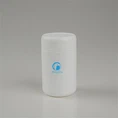When you buy vitamins or supplements, you may notice that some labels say "Do not refrigerate". This can be confusing, especially if you think cooler temperatures always help preserve products. The truth is, refrigeration is not always the best storage method for vitamins. In some cases, it can even reduce their shelf life or effectiveness.
1. Why Some Vitamins Should Not Be Refrigerated
Moisture concerns: Refrigerators have higher humidity levels. When you open a cold vitamin bottle, warm air enters, and moisture can condense inside. This can cause tablets or capsules to stick together, degrade, or even develop mold in extreme cases.
Formula stability: Certain vitamins-especially those in tablet or powder form-are designed to remain stable at room temperature (around 15–25°C / 59–77°F). Sudden temperature changes can damage their active ingredients.
Packaging design: Most vitamin bottles, especially HDPE or PET containers with desiccants (moisture absorbers), are optimized for dry, cool storage in a cupboard, not in the fridge.
2. Exceptions: When Refrigeration May Be Needed
While many vitamins don't require refrigeration, some products do:
Probiotics: Many live-culture probiotics require cold storage to keep the bacteria alive.
Certain liquid vitamins: Liquid formulations without preservatives may need refrigeration after opening.
Natural or raw supplements: Some minimally processed products can spoil faster without cold storage.
Always follow the storage instructions on the label.
3. Best Practices for Storing Vitamins
Keep them in a cool, dry place, away from direct sunlight.
Avoid bathrooms or kitchens, where humidity and temperature fluctuate.
Close the cap tightly after each use to limit air exposure.
Store in original packaging to protect from light and moisture.
















